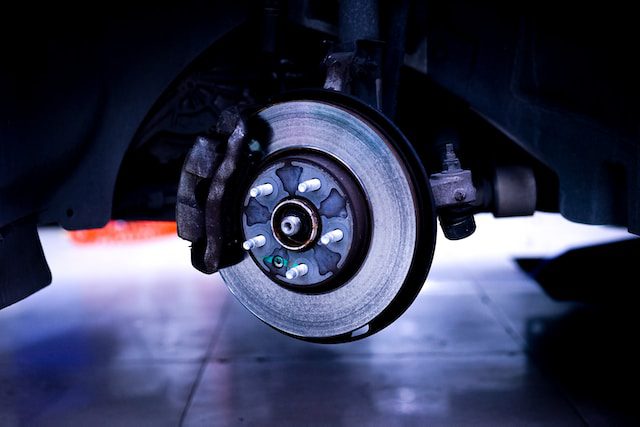
Why Do Car Brakes Squeak
Are your car brakes making an annoying squeaking sound while you’re driving? Wondering why this is happening and how you can fix it? Well, you’ve come to the right place!
In this article, we’ll explore the reasons behind those noisy brakes and provide some simple solutions to eliminate the noise.
Your brakes are crucial in keeping you safe on the road, so addressing any issues is important as soon as possible. Don’t worry – fixing squeaky brakes is easier than you might think. We’ll guide you through the steps to stop the squeaking and ensure your brakes function properly.
We’ll also touch on another common brake problem – a burning smell. So, buckle up and get ready to learn how to silence those squeaky brakes and keep your car running smoothly.
Key Takeaways
- Squeaky brakes can be caused by various factors such as dust/debris, overnight moisture, metallic brake pads, and lack of lubrication on drum brakes.
- Temporary fixes for squeaky brakes include using brake cleaner, compressed air, and gentle cleaning with a soft brush or cloth.
- Overnight moisture can reduce brake effectiveness, cause rust formation, and leave a residue that affects the brake system.
- Regular brake maintenance, including lubrication and inspections, is important to prevent brake noise and ensure safety.
brakes making noise while driving
There could be a few reasons if you’ve been hearing your brakes make a squeaking noise while driving.
- One possible cause is dust or debris accumulated between your brake pads and rotors.
- Another factor could be overnight moisture that has built up on the brake surfaces.
- The type of brake pads you have, such as metallic ones, could also contribute to the noise.
- It’s also worth considering if there is a lack of lubrication on drum brakes.
- Lastly, your personal braking style might impact the noise your brakes make.
Dust or debris between your pads and rotors
Clearing out the dust and debris between your pads and rotors is essential to eliminate the annoying squeaking sound while driving. Dust or debris accumulating in this area can cause friction and squeaking brakes. This noise can be distracting and worrisome, but temporary fixes are available.
One option is to use brake cleaner or compressed air to spray and remove the particles. Another method is to remove the wheels and gently clean the area with a soft brush or cloth.
Regularly cleaning and keeping this area free of dust and debris will minimize the chances of experiencing irritating squeaking noise when braking.
Overnight Moisture
Wake up to a fresh morning, only to find your heart sink as you realize the overnight moisture has left your brakes less responsive than usual. It’s frustrating when your car brakes squeak, especially when you rush to get somewhere.
The presence of moisture on your brake pads can cause a temporary reduction in their effectiveness. Here are three reasons why overnight moisture can lead to squeaky brakes:
- Moisture creates a thin layer between the brake pads and rotors, causing a delay in friction and reducing their grip.
- The moisture can lead to rust formation on the rotors, resulting in uneven surfaces that produce noise when the pads come in contact.
- As the moisture evaporates, it can leave behind residue that affects the smooth operation of the brake system, leading to noisy brake pads.
To ensure your brakes perform optimally, it’s important to address this issue promptly by driving cautiously and applying them gently until they regain their normal responsiveness.
Metallic brake pads
Metallic brake pads offer improved performance and durability, making them a popular driver choice.
One of the benefits of using metallic brake pads is that they can help reduce brake sounds, such as brakes squeaking when backing up or squeaky brakes when braking. These pads are designed to provide a consistent and reliable braking experience, minimizing annoying noises.
Metallic brake pads are less prone to glazed brakes, which can occur when the brake pad material becomes overheated, forming a shiny glaze on the surface. By preventing brake pad glazing, metallic brake pads ensure you can rely on your brakes to stop effectively and quietly, giving you peace of mind while driving.
Lack of lubrication on drum brakes
If you haven’t lubricated your drum brakes properly, you might experience a loss of braking efficiency and potentially compromise your safety on the road.
One of the common reasons for squeaky drum brakes is the lack of lubrication. When the brake components, such as the shoes and springs, don’t have enough lubrication, they can rub against each other and create a squeaking noise.
This noise can become more noticeable when stopping slowly or applying light pressure on the brakes. So, if you hear your brakes making a squeaking noise when stopping, it’s important to check the lubrication levels on your drum brakes.
Regularly applying lubrication can help reduce friction and eliminate the squeaky sound, ensuring your brakes perform optimally and keeping you safe while driving.
Your braking style
Understanding your braking style is crucial for maintaining control and ensuring a smooth and safe driving experience. Your braking style can significantly impact the condition of your car brakes and whether they squeak or not.
When braking, pay attention to how you apply pressure to the brake pedal. Sudden and aggressive braking can strain the brake pads excessively and cause them to wear unevenly, leading to squeaking noises. If you tend to brake slowly and gently, it can cause your rear brakes to grind, resulting in brake noise.
Being aware of your braking style and making adjustments as needed can help prevent car brakes from squeaking and ensure a quieter and more enjoyable driving experience.
| Brake Style | Effect on Brakes |
|---|---|
| Sudden and Aggressive | Uneven wear and potential squeaking |
| Slow and Gentle | Rear brakes grinding and little brake noise |
| Balanced | Minimal impact on brake condition and noise |
Ways you can fix squeaky brakes
There are several ways you can fix squeaky brakes. One option is to use a lubricant to quiet the noise. If your brakes make noise while driving, it can be annoying and concerning.
The brakes make a squeaking noise for various reasons, such as worn brake pads, dust and debris, or lack of lubrication.
To address this issue, apply a brake lubricant to the back of the brake pads or on the contact points between the pads and calipers. This will reduce friction and eliminate the squealing sound. It is important to choose a brake-specific lubricant and apply it carefully, following the manufacturer’s instructions.
Regularly maintaining your brakes will prevent them from making noise and ensure your safety on the road.
Your Brakes Are an Important Safety Feature
Your brakes are an important safety feature. Make sure you take care of them because they are crucial for your safety on the road. Your brakes screeching noise might indicate a problem that needs attention. It’s important to understand why does my car squeak when I brake.
Brakes making noise can indicate worn brake pads or brake rotors. Ignoring these warning signs can lead to more serious issues and compromise your ability to stop effectively. If you hear a bad brakes sound, it’s time to get them checked by a professional. Don’t ignore it when my brakes are squeaking; it could be a safety hazard.
Regular maintenance and inspections are key to ensuring your brakes are in good working condition, so schedule a check-up if you notice any unusual sounds or sensations.
How to Stop Squeaky Brakes
All you need is a simple solution to end those annoying screeching noises when you step on the brake pedal. To stop squeaky brakes, you can try a brake pad fix. This can help eliminate the creaking noise that often accompanies the squeaking brakes.
Here’s a handy table to guide you through the process:
| Step | Instructions |
|---|---|
| 1 | Lift the car and remove the wheels |
| 2 | Inspect the brake pads for wear |
| 3 | Clean the brake pads and rotors |
| 4 | Apply a thin layer of brake pad lubricant |
Following these steps should help you eliminate those screeching brakes and restore peace to your car rides. Remember, maintaining your brakes is essential for your safety on the road.
There’s a Burning Smell Coming From My Brakes
If you smell a burning odor from your brakes, it’s time to take action. Ignoring this issue can lead to serious damage and compromise your safety on the road. Here are some possible reasons why your brakes are emitting a burning smell:
- Your brake pads may be worn out, causing metal-to-metal contact and generating excessive heat.
- The presence of brake dust, dirt, or debris can contribute to the burning smell.
- Overheating caused by excessive braking or a dragging caliper can also be a culprit.
- In some cases, a seized caliper or a faulty brake line can cause the brakes to overheat and emit a burning odor.
To address this issue, it is recommended to have your brakes inspected by a professional mechanic. They will be able to determine the cause of the problem and perform the necessary repairs or replacement of the pads to ensure your brakes are functioning properly and safely.
Frequently Asked Questions
Can squeaky brakes damage my car?
Yes, squeaky brakes can potentially damage your car. The noise could indicate worn brake pads or a brake rotor issue, leading to decreased braking performance and increased stopping distances. It’s best to have them checked by a professional.
How often should I have my brakes inspected?
You should have your brakes inspected at least once a year or every 12,000 miles, whichever comes first. It’s important to ensure they are in good condition to avoid any potential issues or accidents on the road.
Are there any temporary solutions to silence squeaky brakes?
To temporarily silence squeaky brakes, try applying brake grease or anti-squeal lubricant to the back of the brake pads. This can reduce the friction and eliminate the noise. However, having your brakes inspected by a professional for a permanent solution is important.
What are the common causes of squeaky brakes?
Common causes of squeaky brakes include worn brake pads, dirty brake rotors, and lack of lubrication. Worn brake pads can create friction, while dirt on the rotors can cause noise. Lubrication helps reduce friction and noise.
Can I drive with squeaky brakes without any safety concerns?
You shouldn’t drive with squeaky brakes as it can indicate a problem. Squeaking brakes could be a sign of worn brake pads, leading to reduced braking performance and potentially compromising your safety.
Conclusion
In conclusion, squeaky brakes are not only annoying, but they can also indicate potential safety issues. It’s crucial to address these noises promptly to ensure your brakes function properly.
You can effectively stop the squeaking by following the tips mentioned in this article, such as cleaning the brake pads and replacing worn-out parts.
Remember to take your car to a professional if you notice any burning smells or if the squeaking persists.
Stay safe on the road and keep your brakes in top shape!
